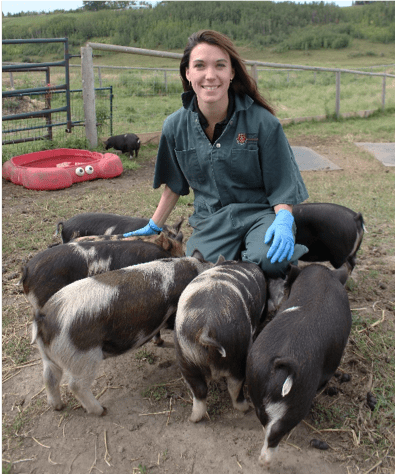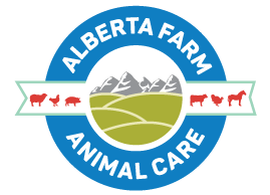Education Outreach for Outdoor Small Lot Pork Producers
Dr. Kelsey Gray DVM, Prairie Swine Health Services
In British Colombia (B.C.), there are over 1500 outdoor small lot pig producers and this is expanding in Alberta and across Canada. This type of production is growing as “farm-to-fork” movements and eating local are increasing in popularity. As this group grows, we recognize that there is a gap in knowledge about raising pigs safely, humanely, and efficiently outdoors.
In 2019, the BC Pork Producers Association (BCPPA) received funding from BC’s Investment Agriculture Foundation (IAF) and from the Canadian Agricultural Partnership (CAP) Program to create a comprehensive educational package of best management practices tailored to small lot, outdoor pig producers. I am very proud to announce that Prairie Swine Health Services was selected to work with the BCPPA and the B.C. Ministry of Agriculture to develop resource materials for this program. The program will include a resource binder, 6 one-day work shops in B.C, online presentation slides and material. Although the focus is in B.C., it is hoped that the material will be welcomed in other regions across Canada.

There are three critical components to the program. The first is educating producers about pig health and husbandry. Some producers are farming pigs for the first time ever. We want to teach them how to feed pigs, how to house pigs, and how to recognize clinical disease. New pig producers may not be aware that pigs are susceptible to sun burns, that they cannot sweat and need pools to cool off in, or that pigs raised outdoors are prone to parasitic diseases. A second component of the program is about regulation around possessing pigs. New producers may be unaware of the Canadian PigTRACE program. This is a federally regulated program that tracks pig movement within Canada for emergency planning, preparedness, and response. Every single pig in Canada must be registered with this program. Registration is free and involves getting a premises identification number, then registering with PigTRACE, and reporting and recording all pig movements within 7 days.
Lastly, the program aims to raise awareness about national and international affairs in the swine industry. For example, African Swine Fever (ASF) is a devastating disease that, although it does not harm humans, can cause 100% mortality in pigs. There is a huge risk of introducing ASF by illegally feeding meat scraps to pigs, which some new producers may be unaware of. This disease is rapidly spreading across Asia and parts of Europe and would cause massive animal welfare issues and trade restriction on our pork sector if it were to come to Canada. Our goal is to make sure ALL pig producers, small or large, raise pigs responsibly and do their part to protect our Canadian pig herd.
On behalf of everyone in the swine industry, I want to express appreciation to the B.C.’s Investment Agricultural Foundation (IAF) and B.C. AGRI’s Biosecurity and Disease Surveillance CAP Fund for funding this project. It is a great contribution to the industry.
